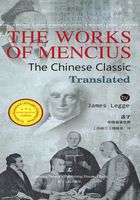
CHAPTER VII
1. Mencius went from Ch'î to Lû to bury his mother. On his return to Ch'î, he stopped at Ying, where Ch'ung Yü begged to put a question to him, and said, 'Formerly, in ignorance of my incompetency,you employed me to superintend the making of the coffin. As you were then pressed by the urgency of the business, I did not venture to put any question to you.


without emolument, and the king employed him on this occasion to give weight by his character to the mission. The officer of 盖 (read kû) was an unworthy favourite of the king. 辅行, not 'to assist him on the journey', but with reference to, what was the business(所行) of it. 见,—4th tone. 反 implies the 往, or 'going', as well as 'returning'.
2. 齐乡之位 refers to Wang Hwan, who had been temporarily raised to that dignity for the occasion. 夫(in 2nd tone) 既或,—'Now there were some'—i.e. the proper officers—治之, 'who attended to them'. The glossarist of Châo Ch'î understands this as spoken of Wang:—'He perhaps attended to them', i.e. he thought that he knew all about them, and never put any questions to me; but the view adopted is more natural,and gives more point to Mencius's explanation of his conduct.
CHAPTER 7. THAT ONE OUGHT TO DO HIS UTMOST IN THE BURIAL OF HIS PARENTS;—ILLUSTRATED BY MENCIUS'S BURIAL OF HIS MOTHER. Compare Bk. I. Pt. II. xvi.
1. The tradition is that Mencius had his mother with him in Ch'î, and that he carried her body to the family sepulchre in Lû.


Now, however, I wish to take the liberty to submit the matter. The wood of the coffin, it appeared to me, was too good.'
2. Mencius replied, 'Anciently, there was no rule for the size of either the inner or the outer coffin. In middle antiquity, the inner coffin was made seven inches thick, and the outer one the same. This was done by all, from the sovereign to the common people,and not simply for the beauty of the appearance, but because they thus satisfied the natural feelings of their hearts.
3. 'If prevented by statutory regulations from making their coffins in this way, men cannot have the feeling of pleasure. If they have not the money to make themin this way, they cannot have the feeling of pleasure.When they were not prevented, and had the money,the ancients all used this style. Why should I alone not do so?


How long he remained in Lû is uncertain;—perhaps the whole three years proper to the mourning for a parent. Whether his stopping at Ying was for a night merely, or a longer period, is also disputed. Ch'ung Yü was one of his disciples. It has appeared strange that Yü should have cherished the matter so long,and submitted it to his master after a lapse of three years. (This is on the supposition that Mencius's return to Ch'î was after the completion of the three years'mourning.) But it is replied in the 四书释地, that this only illustrates how fond Mencius's disciples were of applying to him for a solution of their doubts, and the instance of Ch'ăn Tsin, chap. iii, is another case in point of the length of time they would keep things in mind. 请,—as in Bk. I. Pt. II. xvi. I, 'to beg to put a question'. 敦=董治, 'to attend to'. 匠, as in Pt. I. vii. I.不肖,—see Chung Yung, chap. iv. 严is explained as in the translation. But for the critics, I should render,—'In the gravity of your sorrow'. 窃,—see Pt. I. ii. 20.
2. 'Middle antiquity'commences with the Châu dynasty. 称, the 4th tone, 'to correspond, or be equal,to'. 尽于人心,—于 is not what they call an 'empty character', merely completing the rhythm of the sentence. The whole= 'they felt complete (that they had done their utmost) in their human hearts'.Mencius's account of the equal dimensions of the outer and inner coffin does not agree with what we find in the Lî Chî, XIX. ii. 31. It must be borne in mind also, that the seven inches of the Châu dynasty were only=rather more than four inches of the present day.3. 不得, being opposed to 无财, requires to be supplemented, as in the translation.


4. 'And moreover, is there no satisfaction to the natural feelings of a man, in preventing the earth from getting near to the bodies of his dead?
5. 'I have heard that the superior man will not for all the world be niggardly to his parents.'